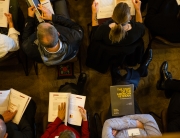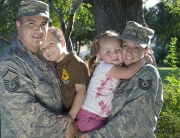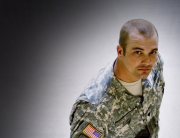by Cortney Fielding
In addition to lugging overstuffed backpacks loaded with books and binders to school each morning, students from military families are also carrying with them the invisible weight of a parent at war.
Since deployments to Afghanistan began nine years ago, mental-health professionals have documented a wide range of social, psychological and educational issues unique to children of America’s soldiers. And while many experts believe the country’s public schools are the best vehicles for delivering interventions that ease and prevent depression, despair, alienation and academic failure, few evidence-based programs have reached them.
But researchers from the USC School of Social Work are bringing these services where they are needed most.
The School of Social Work has been selected by the Department of Defense Education Activity (DoDEA) to partner with eight San Diego-area school districts on a $7.6 million initiative to transform 149 public schools into more supportive environments for military families and their children – with an aim toward replicating programs that work best in schools nationwide.
Professor Ron Astor will serve as the principal investigator for the four-year project, which will operate in conjunction with the school’s Center for Innovation and Research on Veterans and Military Families (CIR) and the Hamovitch Center for Science in the Human Services.
An internationally recognized expert in the area of school-violence research, Astor will work alongside co-principal investigators Anthony Hassan, director of CIR; Marleen Wong, assistant dean of field education; and Rami Benbenishty, a professor at Bar Ilan University in Tel Aviv, Israel.
The team will collaborate with school districts located near military installations, including Marine Corp Base Camp Pendleton. At least 10 percent of the 100,000 children in these districts come from military families. With assistance from 30 Master of Social Work interns trained to deal with military sensitivities, they will focus on two areas: implementing programs that build on the unique strengths military families bring to their communities and testing evidence-based interventions with potential for easing the social, academic and emotional challenges associated with deployed parents.
“Children here are coping with everything from the uncertainty of a parent overseas, to death, physical disability and the intense mental strain of a traumatized parent,” Astor said. “All can be burdens carried forever in their hearts and minds.”
The grant comes at a critical time for the 1.3 million school-aged children with parents on active duty, many who have seen one or both parents through multiple deployments in Afghanistan and Iraq.
Pentagon documents show an alarming increase in mental health problems incurred by military children. In 2007-2008, the demand for psychiatric services to serve these children doubled to 2 million outpatient visits compared to the start of the war. The number of child psychiatric hospitalizations for very severe problems, such as suicidal behavior, increased by 50 percent.
Researchers like Astor believe schools can provide protective environments that could guard against what could be an impending crisis. Studies on post-traumatic stress disorder have shown that supportive schools could shield students from depression, conduct problems, feelings of alienation, anxiety and school failure. And the DoDEA has already been addressing many of these critical needs on military bases outside of the U.S. Eighty six thousand children on military bases have better academic outcomes than the national average and have relatively higher college attendance rates.
One reason for this may be that these schools are specifically geared toward military culture and have a full understanding of student and family needs. But civilian teachers, principals and support personnel in communities surrounding U.S. military bases have never been systematically trained to understand and appropriately respond to the intense experiences of these children.
“Public schools in communities around bases often occupy a different world—a world of civilians not attuned to the psychology of military life,” he said.
In San Diego, the USC team will assess the needs of each participating school by mining through state- collected data that explore everything from community supports and after-school activities to the students’ sense of safety, drug use and school-connectedness levels. They will also collect their own data from students, teachers, parents, social workers, counselors, psychologists and community non-profits. This monitoring process was developed by Astor and Benbenishty for use in Israel, where it produced strong reductions in at-risk behaviors in the country’s 3,000 schools.
Project liaisons on campus, including MSW students, will facilitate partnerships with community groups and national organizations to bring a wide range of potential programs including sports, academic tutoring, social clubs, parent networking and resources. For schools showing greater at-risk behaviors, interventions, such as anti-gang programs or group therapy for students with a parent suffering from PTSD, may be employed.
Some interventions will aim toward a better regional understanding of military culture and experiences. These can include training educators to devote extra sensitivity to students whose parents are about to be deployed or return home, devising ways to welcome new students who must move often to follow an active-duty parent and celebrating military holidays in class.
“The love of country; willingness to sacrifice for the greater good; their caring, tight-knit community structure; and sense of independence are qualities that schools ought to be celebrating in military students and families,” Astor said.
The team will also be looking to the schools for existing programs that are already working.
“These schools have been selected because they are highly committed to serving military students. There are many creative programs, services and ideas that are being used that will be documented and empirically tested to explore their effectiveness.”
All interventions that prove effective must also pass evaluations for sustainability during difficult economic times, Astor said.
“The school districts will eventually need to be able to run the show when we are gone. If it’s a program that requires a lot of extra staffing or expertise that’s not available within the school, then ultimately that just won’t work.”
Working in conjunction with the USC Rossier School of Education, where Astor holds a joint appointment, the team will also create training materials for principals, teachers and other school support personnel that include information on military culture, secondary PTSD, childhood depression and learning impacts on separation and family life in both online and face-to-face formats.
These materials will be part of a new graduate training specialization in school social work with military families.
Astor views the San Diego partnership as a national prototype. At the end of the grant period, he will have provided the DoDEA with data-driven recommendations and intervention models that can be disseminated to public schools nationwide. He hopes to provide the agency with a range of programs that can be duplicated in school systems throughout the country.
“Public schools can play a critical role in increasing resilience of children to separation, loss and other effects of war,” Astor said. “These military families have stepped forth to make our nation safe. Our country owes these students the very best educational experiences and supports that can be offered. This project is an honorable step in that direction.”







